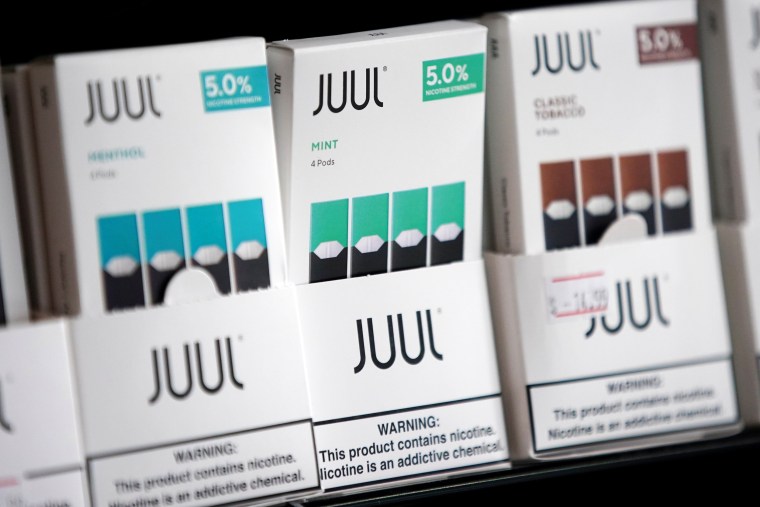With a national ban on sales of most e-cigarette flavors expected any day, Juul has stopped selling its mint-flavored pods shown to be extremely popular among kids who use the company's products.
Juul previously stopped selling mango, creme and cucumber flavors, and now only offers menthol and tobacco flavors.
The move to stop selling mint comes two days after new research found that particular flavor was most attractive to teenagers.
The study, from the University of Southern California, reported that almost half of surveyed high school seniors nearly always chose mint Juuls. High school sophomores also reported a preference for the minty flavor.
"These results are unacceptable," K.C. Crosthwaite, CEO of Juul Labs, said in a statement. "That is why we must reset the vapor category in the U.S. and earn the trust of society by working cooperatively with regulators, Attorneys General, public health officials, and other stakeholders to combat underage use."
Crosthwaite added that his company would support the upcoming federal "flavor policy."
But addiction experts say there is very little difference between mint and menthol, other than a slight chemical variation.
"It's just semantics," said Bonnie Halpern-Felsher, a professor and expert in teen vaping at Stanford University. "Young people are going to switch to menthol. It's really easy for companies to slightly change the formula or just re-name everything and kids won't know the difference."
"They just look for 'green,'" Halpern-Felsher told NBC News.
Experts who study the history of tobacco worry menthol may be excluded from the looming ban because it's highly profitable.
"We can get rid of the thousands of flavors — gummy bears and unicorn poop and all of the silliness," said Phillip Gardiner, the policy and regulatory sciences program officer for the Tobacco-Related Disease Research Program at the University of California. "But you can't get rid of menthol."
Menthol has historically been added to tobacco to make it more palatable because it masks the harshness of nicotine. Allowing sales of menthol-flavored vape products keeps the door open to youth users, say experts.
"The truth is, if you leave something on the market that is going to be a pathway for new users to get beyond the initial difficulty, it’s allowing them to fall into the trap of addiction," said Dr. Sharon Levy, director of the Adolescent Substance Use and Addiction Program at Boston Children's Hospital.
Thursday, the Centers for Disease Control and Prevention updated its count of vaping-related lung illnesses, which now stands at 2,051. Many of those who've been sickened have had to be hospitalized in intensive care units.
At least 39 people have died, with additional deaths under investigation.
There is no evidence that Juul is responsible for the epidemic of vaping-related illnesses. Investigators with both the CDC and the Food and Drug Administration have been unable to pinpoint any single ingredient or brand causing the lung injuries.
The rash of illnesses prompted an announcement from the White House on September 11, when health officials said that all flavors other than tobacco would be part of the ban, including mint and menthol.
"We intend to clear the market of flavored e-cigarettes to reverse the deeply concerning epidemic of youth e-cigarette use that is impacting children, families, schools and communities," Health and Human Services Secretary Alex Azar wrote in a statement in September.
A handful of states and municipalities have already voted on or enacted at least temporary bans on flavored e-cigarettes: San Francisco, Massachusetts, Michigan, Montana, New York, Rhode Island and Washington. All included mint and menthol flavorings in their bans, but most have been met with lawsuits and delays.
Follow NBC HEALTH on Twitter & Facebook.


